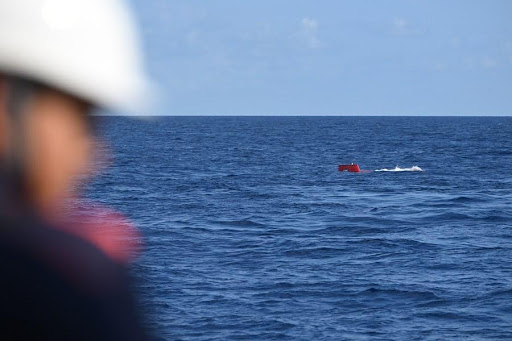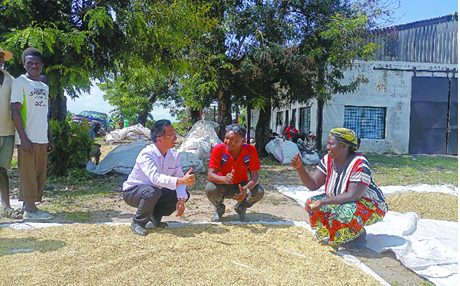t dawn, workers at a fishery on Chagan Lake in Qian Gorlos Mongolian Autonomous County, Songyuan city, northeast China’s Jilin Province, haul part of a fishing net from under the ice, watching plump fish jump out of the hole they dug there the previous night.
“This is the ‘lucky blind box’ that we’re about to launch soon,” Xu Jian, one of the workers, told People’s Daily.
He explained that they were testing a new tourism experience that allows visitors to make a hole in the ice and retrieve submerged nets. The fish caught in the nets will be offered as a reward to visitors who have taken part in the experience, according to Xu.
Chagan Lake has a sound ecological environment and is home to many different species of fish, including bighead carp, black carp, grass carp, catfish, and silver carp, according to a credible source, who said that 5,000 tonnes of fresh fish are harvested from the lake every year.
As the fish population in Chagan Lake and the income of local people were significantly increased through the continuous improvement of the lake’s ecosystems, the idea of ecological conservation has taken deep root in the minds of local fishermen, according to Zhang Wenping, deputy general manager of Chagan Lake fishery Co., Ltd., a company based in the Chagan Lake Tourism and Economic Development Zone, Qian Gorlos Mongolian Autonomous County.
Local fishermen used to catch whatever fish they could regardless of their size, but now they have switched to nets with bigger meshes so that only big fish can be caught, Zhang said.
The company also releases fish fries of different species into the lake every year, according to Zhang, who noted that the fish that live in the lake can benefit from its healthy ecological environment while also helping prevent eutrophication, thus creating a virtuous circle.
Because of the sustainable practices and outstanding performance of the local fishery industry, Qian Gorlos Mongolian Autonomous County has been recognized as a national demonstration county of healthy fish farming, and the fishery on Chagan Lake has been recognized as a healthy aquaculture demonstration farm by China’s Ministry of Agriculture and Rural Affairs.
Chagan Lake’s stunning scenery and the organic fish harvested from it have transformed the lake into an enticing eco-tourism destination. Local businesses such as restaurants, B&B hotels, and agritourism businesses now thrive year-round.
“We used to be off duty after 4 p.m. Now we can work until night falls. Since the environment here has got better and better in recent years, tourists can enjoy more activities and stay longer here. That also means higher incomes for us,” Song Dongyang, head of a cruise boat fleet of a yacht club of Chagan Lake fishery Co., Ltd., told People’s Daily.
Zhu Jiao, owner of a fish restaurant by Chagan Lake, echoes Song’s views.
“We were fisherfolk in the past. When we decided to enter the catering industry, our relatives all disapproved of the idea, as they thought it would be too risky,” Zhu recalled.
In the initial stage of the process of developing tourism businesses around Chagan Lake, only people from neighboring cities would visit the lake in winter, Zhu explained, adding that unstable business prompted owners of fish restaurants near Chagan Lake to work part-time jobs in slack seasons.
“We didn’t have much business in any other seasons except winter, so I sold popsicles and handicrafts when my restaurant wasn’t busy. Now there’s hardly an off season. I receive seven to eight phone calls from customers in various cities every day,” she said.
Thanks to the ever-growing number of tourists drawn by Chagan Lake, Zhu’s business has been transformed from a tile-roofed house with three rooms into a facility with more than 20 guest rooms that can accommodate over 300 diners.
Focusing on the natural appeal of Chagan Lake, Songyuan city has pooled resources to transform itself into a famous tourist city, incorporating 81 types of seven kinds of eco-tourism resources into its overall planning for the goal.
During the first half of this year, the city received nearly 7.19 million tourist visits. It’s estimated that the city’s annual number of tourist visits will exceed 10 million and its annual tourism revenue will surpass 15 billion yuan ($2.12 billion).
Chagan Lake was not always as beautiful as it is today. All these thriving scenes were unimaginable in the 1970s, when the water surface area of Chagan Lake continued to shrink due to disruption to water inputs from upstream.
“Local people had to make a living by doing odd jobs or making salt and alkali. Life was so hard at that time,” said Shan Junguo, director of the publicity center of the Chagan Lake Tourism and Economic Development Zone.
Since 1976, local authorities have taken comprehensive measures to restore the lake’s ecosystems, including diverting high-quality water from major rivers, planting aquatic vegetation, and optimizing plantation structure of surrounding farmlands.
These efforts have steadily improved the water quality of Chagan Lake, leading to a thriving ecology and flourishing fisheries and tourism in the locality.
“Chagan Lake’s scenery is picturesque from every angle now,” Shan said as he took pictures of the lake.
After Chagan Lake was connected to the river system, consisting of the Songhua River, Chagan Lake, and the Nenjiang River in northeast China, the entire lake can be completely refreshed every three years, according to Gao Hongchen, deputy head of the management committee of the Chagan Lake Tourism and Economic Development Zone.
“The busy ice fishing season is coming in a month, when it will get so crowded that there will be traffic jams on the lake,” Gao said, pointing to the frozen lake, where an idyllic scene heralded an abundant harvest of fish.
“Ecology is the most valuable resource that we should spare no effort in protecting,” said Li Xiaojie, Party chief of Songyuan city.
“We’ll stay committed to our efforts to grow stronger by leveraging while conserving our ecological resources, and make our golden calling card of Chagan Lake shine even brighter,” he added.












